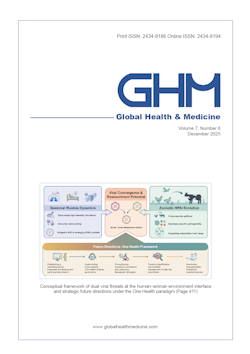Global Health & Medicine 2019;1(1):23-29.
Hepatocellular carcinoma with non-B and non-C hepatitis origin: epidemiology in Japan and surgical outcome.
Kokudo N, Takemura N, Kanto T, Tateishi R, Igari T, Hasegawa K
During the last two decades, there has been a dramatic increase in so-called non-B non-C hepatocellular carcinoma (NBNC HCC) in Japan. Majority of NBNC HCC are considered as so-called metabolic HCC and some could be related to occult HBV infection. Although there have been some reports on histological features predominant in metabolic HCC, very few specific driver genes for NBNC HCC have been reported. Most of the NBNC HCC are found incidentally and are relatively large in size. Since liver function is generally normal or subnormal, such patients have a higher chance for undergoing curative surgery. Although there has been slightly conflicting long-term outcomes reported for NBNC HCC, slightly better outcomes may be expected compared to other etiologies after curative surgery. However, risk of recurrence depends on the background liver. NBNC HCC in cirrhotic patients have a persistently higher risk of tumor recurrence requiring a long-term postoperative surveillance. It would be safe to conclude at this moment that NBNC HCCs should be treated using the same surgical strategy as HCCs with viral origin, same operative indications and same follow-up protocol.
DOI: 10.35772/ghm.019.01018







